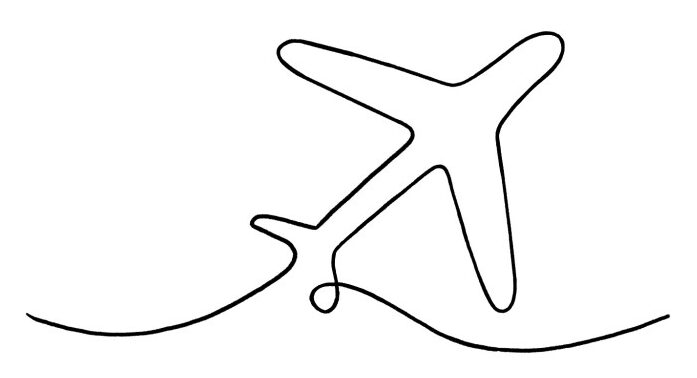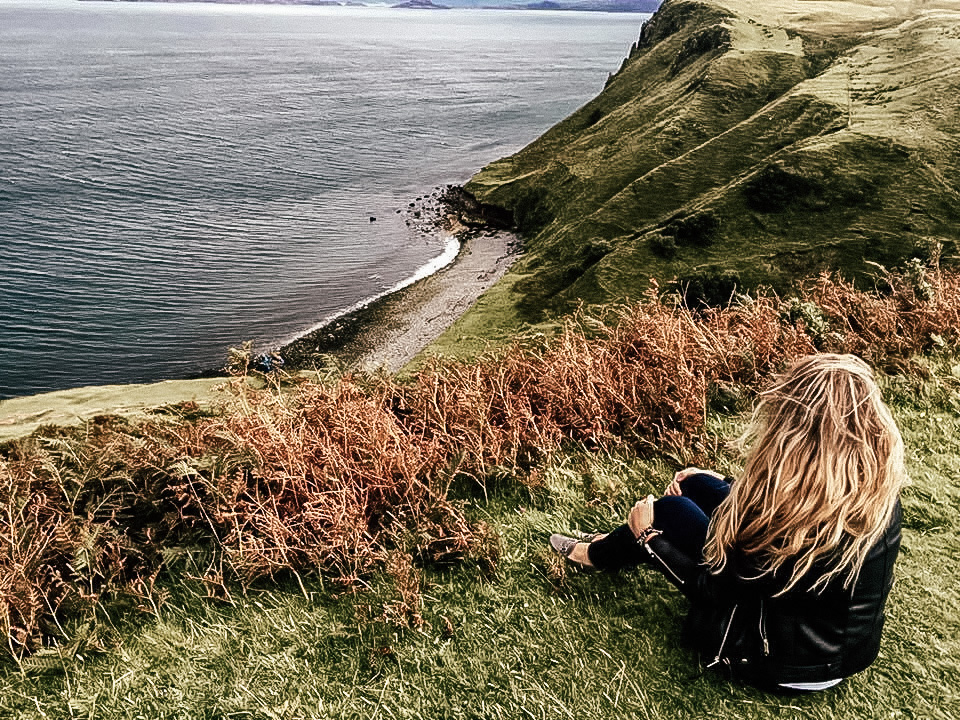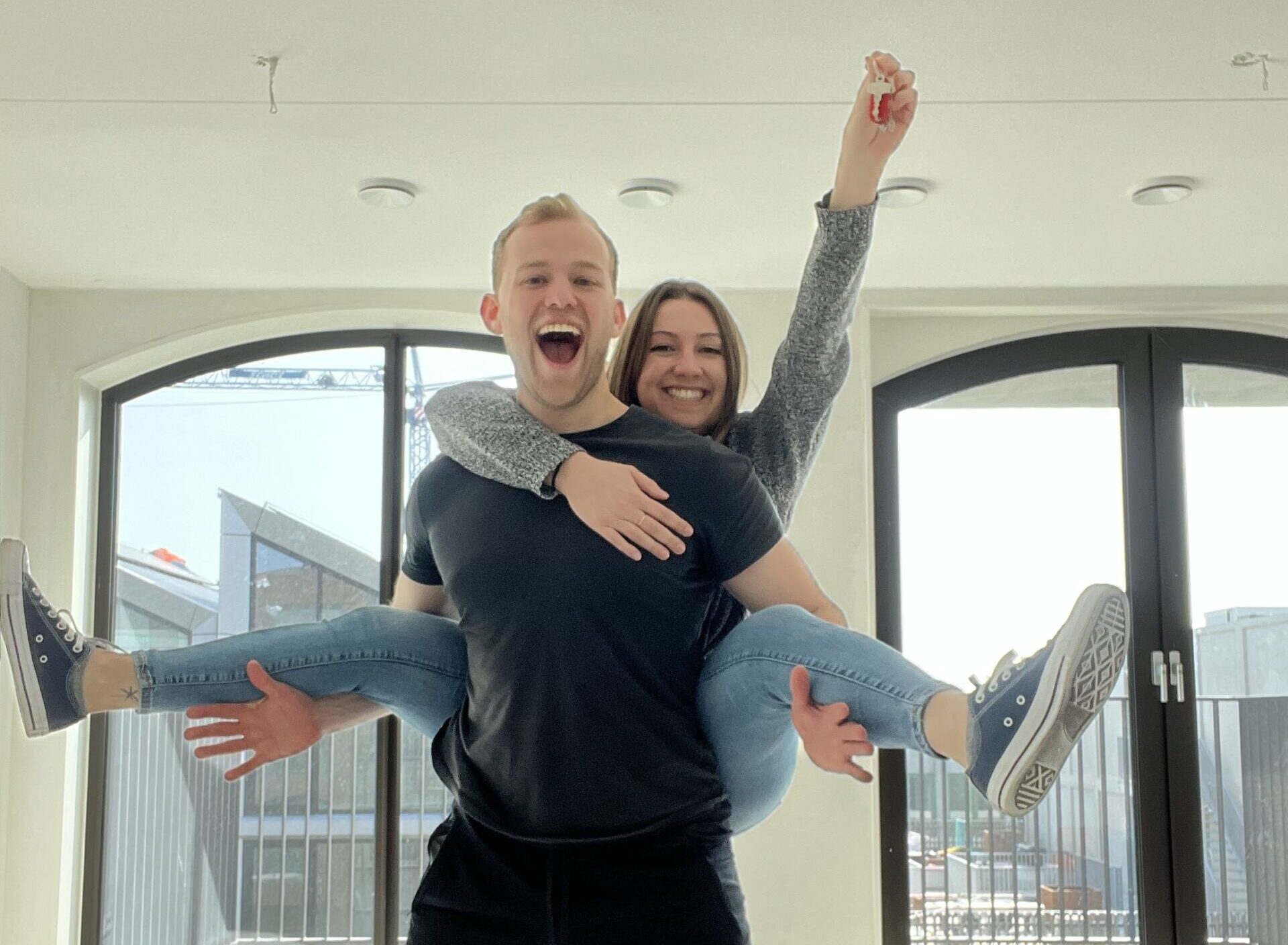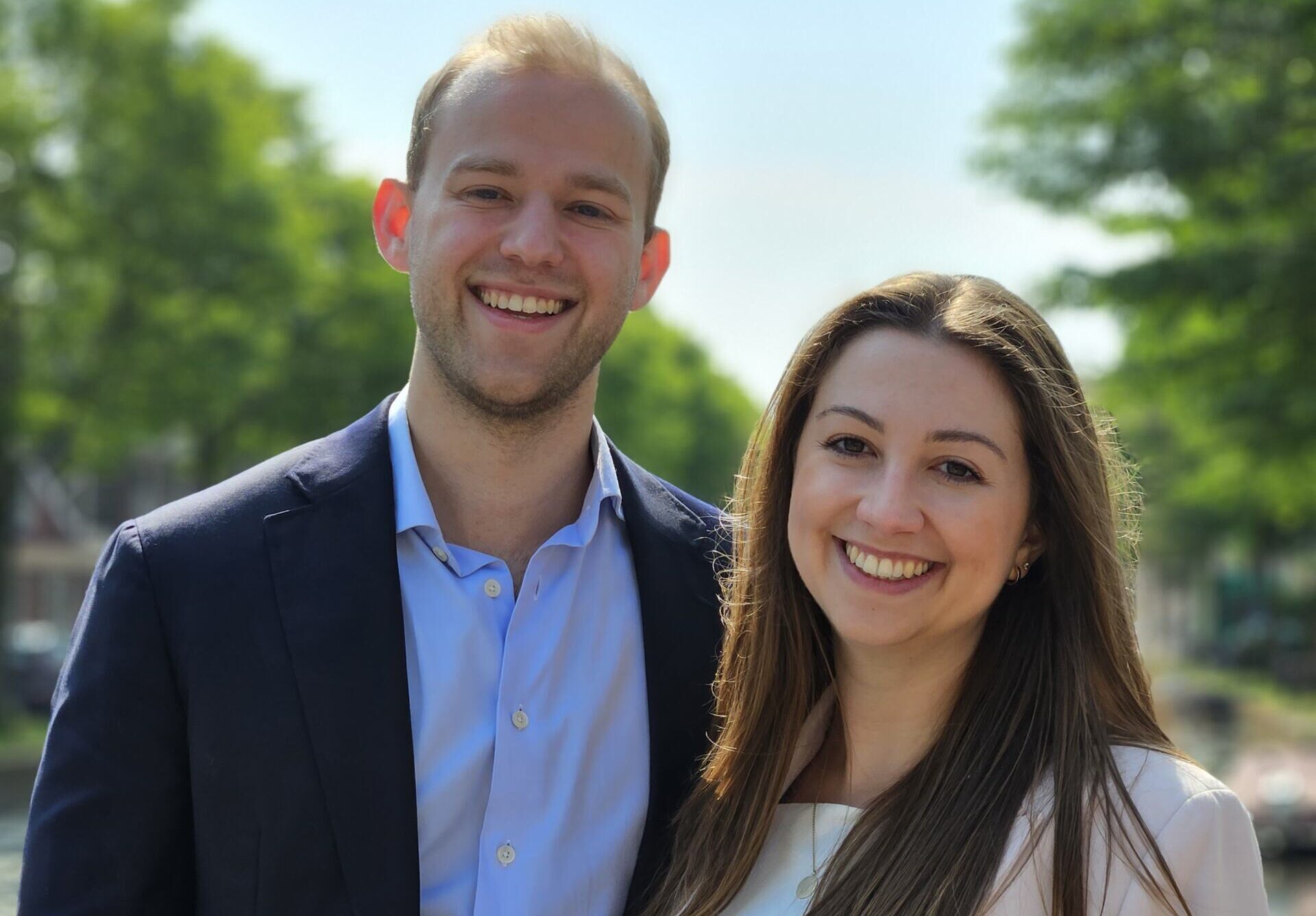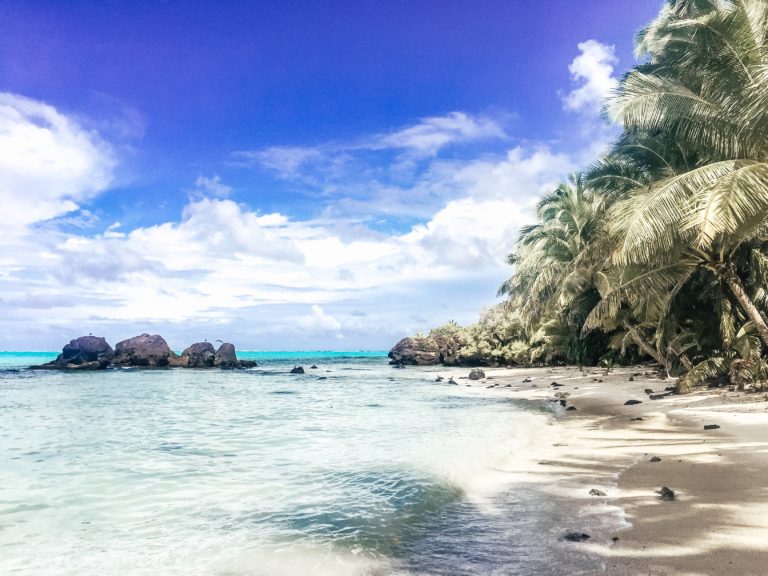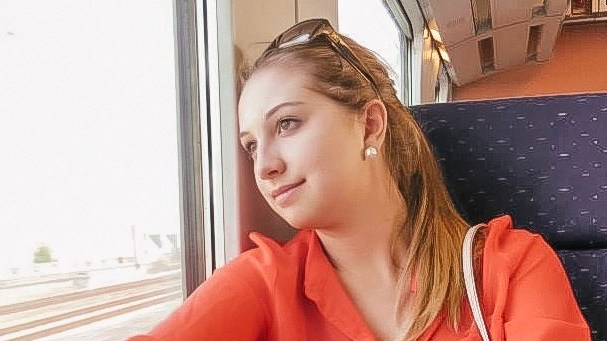Settling in our new life in Cotonou
The anticipation had been real. Four months of intense pre-departure to-do lists (including getting a registered partnership for our relationship to be legally bound), followed by one month of living in a hotel in The Hague, and trying to squeeze in everyone to say our goodbyes before leaving. We had left our beloved apartment in Amsterdam at the end of July, as our furniture had to be sent on its way to Africa in a container by sea. And so began a living-in-our-suitcases period that was going to last a lot longer than we expected…

At the end of August, we boarded the plane towards our biggest life adventure thus far. Sure, I had lived and worked abroad before, but it had always been for shorter periods. Even our Amsterdam chapter turned out to have only lasted 1.5 years in the end. This time, the idea of signing up for a 2 or 3 years contract to go to a country we had never set foot in was as scary as exciting. At least, Daniel and I knew we had each other and that was reassuring from the start.
Arriving in Cotonou
Waiting for us at the airport were the new Deputy Ambassador, who had just arrived a month earlier, as well as the Operational Manager, who had already been here for 3 years. We received such a warm welcome, it was truly touching. They brought us to the hotel we would be staying at until we could find ourselves a new home, where we also met the then Ambassador, who was leaving her posting to retire the week after. I was a bit stressed to meet Daniel’s new colleagues right off the plane, but everyone made me feel very comfortable.
Just like it had been for every other country I had moved to, it was a bit overwhelming at first. This time, it was also a bit different as I was merely a +1 tagging along the embassy’s newest recruit. In our hotel room, we found a welcome card that was addressed to ‘Daniel & Marie-Eline’… Let’s just say it’s not the best feeling when they don’t even know your name. At that moment, I just hoped it wouldn’t be representative of the rest of our experiences abroad. Fortunately, I was quickly reassured, as the embassy made a point of making the partners feel included in this experience, which I greatly appreciated. The next morning, Daniel already had to go to work and so began my stay-at-the-hotel-partner experience.
Creating a social circle
Soon after our arrival, the new Ambassador arrived with his wife, who rapidly took me under her wing to help me get comfortable in this new life. She had 20+ years of experience following her husband on different diplomatic postings abroad, so I was grateful to be able to learn from her and have a first friend here. In the first weeks, we were so inseparable that people thought we were mother and daughter (they still sometimes do, as we also look a bit alike!). We joined a francophone group called Cotonou Accueil, which organizes all kinds of activities for expats, ranging from cultural discoveries to sports and arts. Although open to everyone, most members are ladies between 35 and 60 years old (more or less). I’m not sure if that’s because most trailing partners today are still mainly women or because the activities proposed interest male partners less, but in any case, it has a very feminine vibe. I therefore started doing aquagym twice a week with the ladies, which allowed me to create a social circle and get out of the hotel room. Although I’m the youngest (and only Quebecer!) of the group, everyone made me feel welcome and it gave me a sense of belonging. Some ladies had already been living here for multiple years, while others had just arrived like me. It was a perfect mix of feeling understood by those in the same situation as me, while also being able to get tips and advice from those with more Benin experience. It also allowed me to get some cultural experiences in and start discovering my new country of residence.






Buying a car
While Daniel was working, it was up to me to look for our new home and find ourselves a car. In Benin, you can’t really get around without a car, so we had to make that investment to be able to enjoy our life here. Our first idea was to buy a car from a departing diplomat, as it would probably be in good condition and would already have the diplomatic license plate. However, having arrived in Cotonou at the end of the summer, everyone had already left and there were no cars left. We learned that most diplomats switch countries during the summer to allow children to settle in their new country before the school year starts. Not having children yet, we had arrived very late in the summer, not knowing.
We therefore had two choices left: buy a used car from a random person or buy a new car. At first, the idea of buying a new car was very scary to us, especially knowing the traffic conditions and state of the roads in Benin. It didn’t make sense to invest in a new car if it were to get damaged soon after. I therefore started learning about the used cars market in Benin and quickly realized it would be very different from what I was used to in Canada. Here, to get the best deal, you have to buy your car from the big automobile park directly at the harbour. This is where cars from all over the world arrive and are stored until bought by either a person or a used car dealership. We were told there was no advantage of going through a used car dealership, as it doesn’t give you any quality assurance and just increases the price. We therefore went to the automobile park and started looking at some options. Quickly enough, we realized that most cars were in bad shape, even newer ones. Ripped seats, stained ceilings, missing pieces, this was not looking good. Not being mechanics, it was very scary and overwhelming to us, as we couldn’t know what would be a good purchase.
The shopping experience at the automobile park was quite funny however. We went there with an independent car salesperson who had been recommended to us. We had driven there with him and a chauffeur and, of course, his car broke down twice on the way there (reassuring!). When we arrived, we were quite overwhelmed by the size of the place. Indeed, the Cotonou automobile park covers 140 hectares and is the biggest in West Africa. It’s quite impressive to see! For each car, there were at least 5 to 7 men around us: one had the car keys, one had the battery to start the car, one was selling water, one was the owner of the park, etc. Everyone had a specific role. If I had a question, I was getting 5 different answers. No matter where in the world, I’m always very suspicious of salespeople, as I’m always worried they will only tell me what I want to hear. I therefore asked some trick questions to test if I was being lied to and, indeed, it seemed that no one was being honest. This was really not looking good. Cherry on top of the sundae? There were always random guys walking by and taking pictures of me in my face or jumping in front of me to get a selfie with me. I had already experienced that in India, but it still makes me uncomfortable every time, no matter the country I’m in.
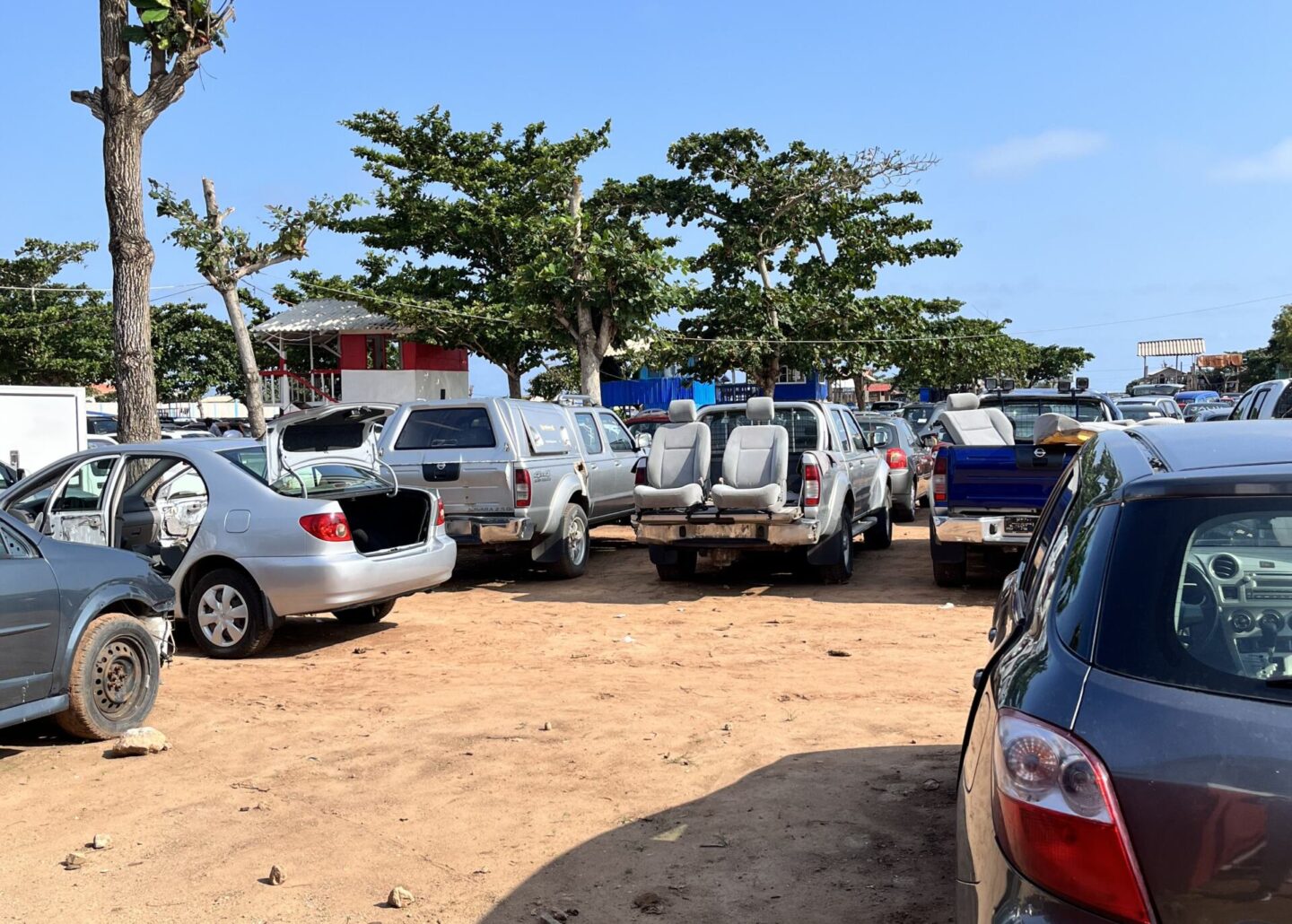
After hours in the sun, we thought we had found a car that we liked. Of course, during this whole process, the prices are not communicated to you right away. I guess they gauge how much you seem interested and adjust their price accordingly. To know the price of our preferred choice, the little group brought us to a wooden tower that was overlooking the car park. We climbed the trembling staircase and at the top was a Lebanese man on his velvet couch smoking a cigar (a lot of Lebanese have immigrated to Benin and are known to be tough business men here). It was a scene out of an action movie. We sat on the little wooden chairs in front of this imposing man and shyly asked for the price. Of course, I was doing all the talking since Daniel’s French wasn’t good enough yet. Looking straight ahead, avoiding any eye contact with me, the man gave me a ridiculously high price. We thanked him politely, sweating, and made our way back down. We were all but comfortable.
Back at the hotel, I did more research about the used car market in Benin and discovered that a lot of cars found at the automobile parks in all of West Africa are in fact often stolen from the United States and Canada (CBC News and National Geographic recently reported on the topic). Way to reassure me… Daniel and I were starting to have anxiety about it. Buying a car involves a lot of money and we didn’t feel comfortable at all. After much reflection, we therefore decided to buy a brand new car. Sure, it was going to be a lot more expensive, but we would at least be buying some peace of mind and the knowledge that we were not contributing to the increasing car trafficking business. We also wanted to avoid making a bad purchase and having to deal with getting the car repaired constantly.
After visiting some local dealerships, we finally settled on a Hyundai Tucson 2023. We had to pay the full amount in one go, which was stressful to us. It took about a week for our international transfer to go through and to get a confirmation that our payment had been received. I think Daniel had an average of 4 hours of sleep that week. Then, we needed to find car insurance. After talking with various companies (everything is done by WhatsApp texting here, which is a lot more casual than what we are used to), I finally chose l’Africaine des Assurances, as they could also insure us if we drive to Togo and Ghana. Only after that contract was signed and fully paid could I finally also apply to get our diplomatic license plate. I gathered all the documents and brought them to the embassy who had to do this request in our name.
To give you an idea of the length of the process, we purchased the car on September 27th and applied for the plate on October 10th. We finally got the keys to our car on November 15th. Definitely a good patience exercise…
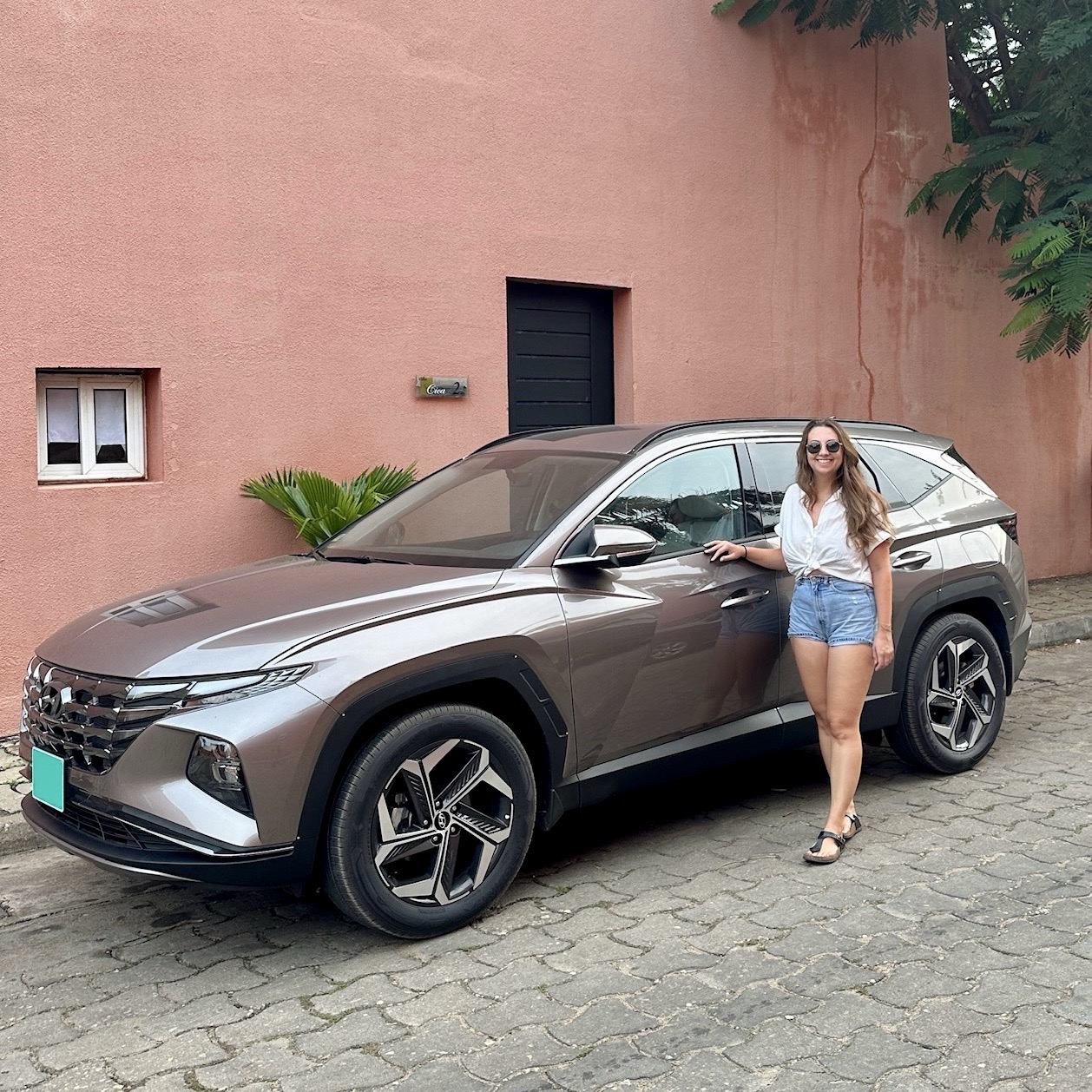
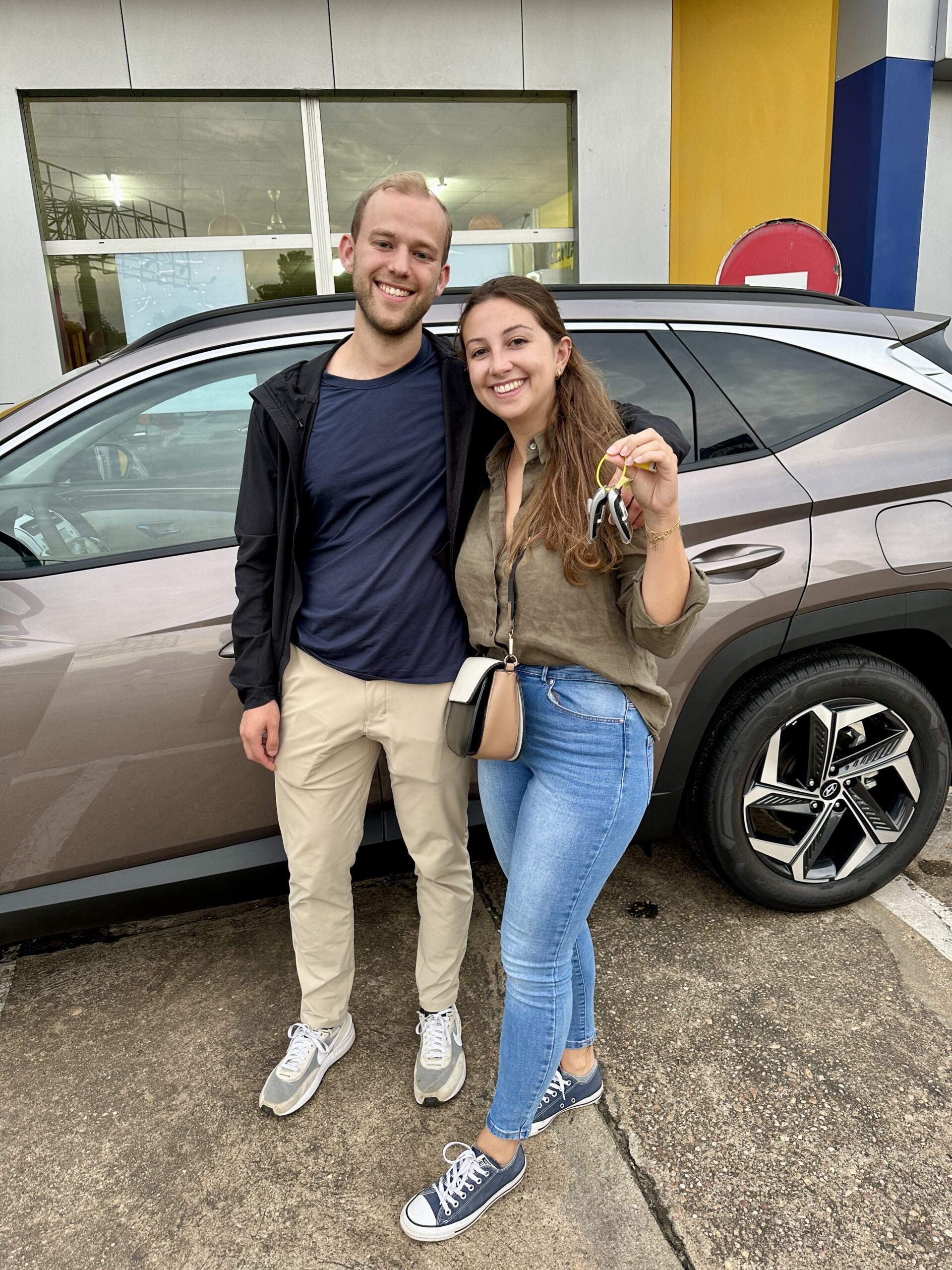
How were we getting around in the meantime you would ask? Well, Benin has its local Uber equivalent, called Gozem, with an app allowing you to order a zem (local motorbikes with the yellow shirts honking at you in the streets) or a car. The app works well most of the time, but drivers don’t always understand how to properly use it. When ordering a car, you put your geo-localization on the map in the app to notify the driver of your position, as well as the geo-localization of the place you want to go to. But, instead of following the map, the driver will call you and ask where you are instead… You proceed to telling them that you have already indicated your position in the app. Sometimes they’ll get to you just fine, sometimes they’ll call you asking to help them navigate. Then when they pick you up, their first question is where you’re going. Again, you tell them that you’re going where you put in the app. It doesn’t matter, you need to tell them again and guide them through the city. For some, it’s because they don’t want to turn on their internet data to navigate (as it costs money!) for others it seemed to be just a lack of understanding of how the app works. I was, however, sometimes lucky to get some drivers who understood it, and those were goooood days. Nevertheless, we were happy to finally have a car and be able to be a bit more independent.
Finding a home
The other stressful thing that we had to take care of was finding our new home. Daniel having to go to work, the main part of that task was also, of course, mine to handle. First, I had to get a sense of how real estate works in Cotonou. I quickly realized that this would be, again, very different from what I was used to in Canada or in Europe. Not one real estate website had up-to-date listings. Most of them also didn’t answer messages. I therefore turned to Coin Afrique (the local equivalent of Craigslist, Kijiji, Marktplaats, etc.) to find recent listings. When contacting the advertiser, I realized that I was never speaking to the home owner or a proper real estate agent, but rather to what is called here a démarcheur (canvasser in English). These are people working independently, making money from charging a visit fee to show properties they have in their network. I ended up texting with 15 démarcheurs who kept sending me listings (often the same ones, Cotonou is not a big market) at all times of the day and night. Most times, pictures of the kitchen and bathrooms were left out, as these were often deal breakers. It therefore took a lot of back and forth before getting a real picture of what the house or apartment truly looked like. For some reason, people here also really like taking pictures diagonally, which I thought was very funny. Then, when going on a visit, the démarcheurs would also sneakily bring us to properties we hadn’t previously agreed to view without telling us, to try and find us our home at all costs and get a commission. It was a mess to manage.




The more properties I visited, the more I understood the local standards of living. Kitchens usually only consist of one countertop with a sink and cupboards at the bottom, where you can store your things directly on the floor. You then have a fridge in another corner of the room, and the stove/oven in another corner. Bathrooms would also usually be huge, with the sink in a corner, the toilet in another, the shower in an other and the size of a dance floor between it all. You can also expect blue or purple lighting (which is considered a luxurious and modern thing to have in a house here) and power plugs at weird heights on walls (or ceilings). I’ve seen bathroom sinks being used as kitchen sinks, bathrooms with gold appliances and toilet rooms where the toilet is alone at the end of a long, dark corridor. I’ll give it to the Béninois however, they are creative!
The Ministry of Foreign Affairs had given us a budget for our house, but it became clear that it was going to be difficult to find something suitable within that budget. Every couple of years, the ministry conducts a research on the local housing market. However, in Cotonou, they had included the whole city, whereas the embassy only considers 3 neighbourhoods to be safe enough for us to live in. Cotonou is also currently developing at the speed of light since the new president came into power, with new houses and roads being built, as well as neighbourhoods being gentrified. So, believe it or not, apartments or houses with European/American standards here are more expensive than in a city like Amsterdam. So to everyone who would believe that it’s cheaper to live in Africa, think again. There isn’t a middle-class like we are used to here in Benin. You are either very poor or incredibly rich, so it’s hard to find something in-between. Of course, the budget that was given to us fell right in that in-between, which basically made it mission impossible to find something suitable.
What also came as a surprise to us, is that we are not allowed to add some of our personal money to the given budget to get our preferred home. While I completely understand and agree that the ministry shouldn’t have to pay for us to live in our preferred standards, I thought we would still be free to add on to what they offer. However, we then learned that the ministry has a “sober living” policy, to avoid diplomats living in houses that would appear too luxurious to the public eye. Therefore, every house we would find would also need to be approved by the ministry. Not having the final say on where we would live was a new concept for me and was a bit scary, as I felt not in control. To me, a house is such a personal thing to choose and can impact so much your whole experience in a country that it was starting to give me anxiety.
Weeks passed and it seemed impossible to find something within the budget that also met the 4 pages of criteria given by the ministry, mainly regarding sustainability and safety. Every house or apartment was worse than the last one. Moreover, many houses here are built beautifully, but unfortunately the owners don’t invest in maintaining them over the years, leaving them in a poor state. We were discouraged. We weren’t asking for a castle, we simply wanted something that felt safe and was not completely falling apart.
After a few weeks, I finally stumbled upon the PERFECT apartment. It was an “all-inclusive” price, meaning that it already included mandatory things for us like a generator, a water tank, and 24/7 security guards. With these costs already included, it was adding up to the same amount as having a stand-alone house and adding all the additional security required by the embassy. We were ecstatic! Finally, after weeks, we had found something.
This happiness was short-lived. Indeed, we were informed that actually, combining the basic housing cost and security cost in an all-inclusive price doesn’t work, since these come from two separate budgets. We were devastated. It had already taken us 1.5 months to find a suitable option and had waited for an additional 3 weeks to get this refusal, during which our stress levels had gone through the roof. I couldn’t believe that there was no option to make it work if the total was the same in the end. And not being able to make sense of it was the hardest part for me. I can already hear most of you say “ahhh it’s not the end of the world, there are worse things in life than not getting the apartment you want!”. I absolutely agree with this, but it wasn’t really about the apartment. It was about not having control over where we were going to live, which not only was a first for me, but was also something I did not expect. Plus, I really couldn’t rationalize the refusal. I was told that I just needed to let it go and forget about it and that sometimes in this life things won’t make sense and you just need to accept it. When you’re in a new country, without your usual social support system, and overwhelmed by your new surroundings, things like these really take bigger proportions in your head. It became such an emotional topic.
At that point, I just felt not in control of my life. There it was, the very feeling that I had wanted to avoid when we were hesitating about jumping in this life (because I had felt like that during my time in the Maldives, which was slightly traumatic to me). I was angry, I was sad and I was tired. We had been living at the hotel for two months (three months even, including the time in The Hague!), still living in our suitcases, still without a car to go around, still without our container, which was constantly being delayed, and I also still didn’t have a work permit. Before experiencing it, I thought living in a hotel would be a dream come true, but let’s just say that after 3 months, you kind of just want to be in your own things and not live in a suitcase anymore. I was aching to just be settled and be done with this transitional period.
Luckily for us, around that same time, a cute house became available through an expat agency. Was it our dream home? No. But it was perfectly suitable for 2-3 years. At this point, we had a good understanding of the local market and didn’t think we would find anything better in the short-term. We were simply relieved that there was finally a suitable option. We just wanted to settle down and be done with it. When visiting the house, we had a good vibe and could visualize making a home out of it for a few years so we went for it. This one rapidly got approved as it fitted in the budget splits. At last, we could stop searching and start picturing our life there, which was just a big relief at that point. We finally got the keys to our new home on November 22nd, almost 3 months after arriving in Cotonou (and 4 months living in hotels).
Settling in our new home
We have now been living in our new home for about 4 months. The whole settling in period will have been a 6-month long intense emotional roller-coaster that took me by surprise. I knew there were going to be challenges when we decided to jump into this new adventure, but I honestly never expected to feel so control-less. The settling down period was a lot more intense than I thought it would be, and I sure wish someone would have told me certain things to better manage my expectations. All in all, I’m taking this as a big learning experience to take with us on future postings. It definitely made me work on my patience and my resilience. To those who have an idealized view of the diplomatic life, don’t be fooled. This path, like any other, comes with its load of surprises and challenges. They are just different. Nonetheless, we still feel lucky to have been given this opportunity and don’t regret our decision to embark on this path. I guess we just went through a (much needed) tuning period about what to expect for the future. After this first experience, I feel hopeful that settling in our next postings will be a bit easier emotionally, knowing more about the process and managing our expectations better.
After getting the keys to our house, we received our container and finally unpacked our boxes. It was weird to see our Amsterdam furniture in the middle of an African-style house, but being in our things provided us with a homey, comforting feeling. Of course, like every house in Benin, ours came with its load of problems: the electricity was (actually still isn’t) not wired properly so the breaker is constantly jumping and our water pump wasn’t pumping water properly (on top of the recurring general water cuts happening in the city), so we were often days without water, taking our shower with bottles. Then there were also some holes in the walls, letting the water in when it rained and, in the first months of us moving in, the water heater broke, the toilet broke and the heavy wooden wardrobe doors started falling on us as they were not properly installed. Last but not least, we met our new friends the big spiders and cockroaches. At first, we would sing “la cucarachaaa, la cucarachaaa” every time we would go to the bathroom (as they tend to prefer humid places) to make it less dramatic and scary if we came face to face with one, but we stopped after a few weeks, having established an efficient strategy to get rid of them without poisoning ourselves with Raid (a spray bottle filled with water and dish soap).
Dealing with these house problems has gotten me on the edge of a mental breakdown. Various “professionals” (electricians, plumbers, glaziers, name it!) showing up hours later than agreed (if showing up at all…) without any notice and then telling me they have fixed the issues, only for them to come back a few weeks later. I have therefore been dealing with the same house problems for 4 months. After I got a huge electric shock touching our toaster, the house management team finally intervened (turns out the electricity had not been grounded…). I now have nerves damaged in my arm and had to do some blood testing and an ECG to make sure my heart wasn’t affected. This is where I drew the line and made it clear that if the problems would not be getting fixed soon, we were going to move houses. The thing is, we might just as well move houses to be stuck with the exact same problems.
The healthcare system in Cotonou
Believe it or not, but in our first 6 months of living here I already got to try various healthcare services in Benin.
While in Canada over the Holidays, I had to get a small emergency surgery for a cyst that had gotten out of control, a week before flying back to Cotonou. I therefore came back to Benin limping, with two layers of sutures, including 15 suture points that would need to be removed a week later. I’m not sure if it was the 23-hour journey to come back through Istanbul (cheaper than through Paris during Christmas time!), the humidity or the sand brought in with the harmattan, but as soon as I got back to Benin, my wound got infected.
I therefore urgently found a local dermatologist to assist me, the private medical clinic I had had the surgery done at in Montreal refusing to help me remotely (what a great service for 1 500 CAD…). It was a bit stressful to me to have to do the follow up part of my surgery here in Benin, but I was short of other options. Fortunately, I found a brand new clinic close to our house, which looked modern enough, where the dermatologist confirmed that the wound was infected and instructed me to start taking the antibiotics the Montreal clinic had prescribed me. At the same time, she advised to remove the stitches, as they had now been there for the maximum amount of time. The nurses at the clinic took care of that.

A few days later, I was covered in hives, as I was having an allergic reaction to the antibiotics. The local dermatologist assisted me urgently through Whatsapp to control the reaction, to avoid having to wait for her office hours at the clinic. I wish we had that kind of assistance in Québec!
A week later, I showed up to my follow-up appointment only for the dermatologist to discover that the nurses had forgotten to remove one of the suture points, which my body was now rejecting (which also explained why I was in so much pain). Fortunately, the infection had resorbed, but my skin was now creating a huge keloid. So I had to apply a collection of various creams for about a month. I couldn’t wait to be done with this whole saga!
I was grateful and reassured to have found a doctor in whom I had trust here. I had never felt so vulnerable than having to deal with all those complications in a country that doesn’t have the most advanced healthcare. Almost 3 months after our return here, I’m finally almost done with my convalescence and this whole saga (hopefully?) and can start swimming and doing sports again in a few weeks.
On top of that, as previously mentioned, I also got electrified at home. This time, I tried MEDOM, an at-home medical service that had been recommended to me. In less than an hour, a generalist was with me, in the comfort of my home to assess the situation and organize the treatment. Half an hour later, a nurse came to take some blood samples with all his equipment directly at my home again. He also made a point to open the new needle in front of me to make sure I saw that it was sealed and sterilized, which I appreciated. The same evening, the cardiologist was at our house to do the ECG. I was truly amazed with the efficiency and professionalism of this service. Over the next few days, I got a few calls from MEDOM to ask how I was feeling and make sure I was ok (it was a few too many calls for my liking, but I appreciated the concern). Only when they were certain I was fine did they send me the bill. Lastly, the founding doctor also called me to get my opinion on the service and see how they could improve. This experience really reassured me about having other future healthcare problems in Cotonou.
Last but not least, I also found a brand new dental clinic in Cotonou and had, again, the best experience. Dr. Fatima Assani Agbanri is originally from Benin, but grew up, studied and started her career in France before moving back to Cotonou to move closer to her family and reconnect with her roots. She opened her clinic a few months ago, with all the modern equipment I was used to seeing in clinics in Canada and Europe, which was really reassuring.
Having access to proper healthcare was a worry I had before moving to Benin, having been told all kinds of stories, but my various experiences with the different medical services here came as a huge relief. Of course, if we had to get surgery we would still have to be repatriated to Europe, but at least the basic care is there.
The end of the honeymoon period
After 6 months of living in Cotonou, it hit me that I was going to have to adapt to things not working the way I’m used to instead of trying to fight it, or I was not going to make it for a few years (or otherwise go completely crazy!). While dealing with the house and health problems, I also got confronted with the end of what we call the “honeymoon period”, which is when all the new exciting things about your new life abroad, which gave you adrenaline and this sense of adventure you had been craving at first, finally start feeling more frustrating and scary than adventurous. It finally sinks in that you’re not here for a short period of time “just to try it”, but for a few years. And then it hits you. You realize that you have to find ways to adapt to the challenges you are faced with in your new host country, or else you will be miserable for the remainder of your time there. You have to find ways to suck it up, push through and find joy in the little things. Now that this shock has passed, I have made peace about being here for a few years and try to focus about the nice things that this life brings to us here, like a more relaxed lifestyle.
So there you have it. This is how the past 6 months of our life have been. Needless to say it has been more than overwhelming. I would be lying if I said that I found adapting to the culture here easy. The truth is, I’m way out of my comfort zone this time! But I’m trying to focus on the reason that made us jump in this new adventure in the first place. Our goal for 2024 is to take it slow, enjoy the nice beach bars, play tennis at the local club, join a local gym and focus on enjoying quality time together. This is going to be an interesting one for sure.
